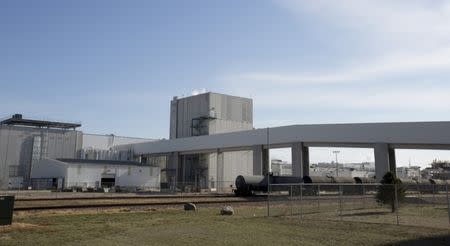ABC TV settles with beef product maker in 'pink slime' defamation case
By Timothy Mclaughlin (Reuters) - The U.S. ABC television network, owned by Walt Disney Co , has settled its closely watched defamation lawsuit with Beef Products Inc over news reports on a processed beef product that critics dubbed "pink slime," both companies said on Wednesday. Terms of the settlement, which also covered the Beef Products Inc (BPI) claims against ABC reporter Jim Avila, were not disclosed. Privately-held BPI had claimed that the American Broadcasting Company (ABC) and Avila defamed the company by calling its processed beef product “pink slime” and making errors and omissions in a series of 2012 reports. BPI calls the product "lean finely textured beef." BPI attorney Dan Webb told Reuters the settlement came together "quickly this week," but declined to provide details, citing a confidentiality agreement signed by both parties. The settlement came 3-1/2 weeks after the trial in the case got under way in Elk Point, South Dakota, around 25 miles (40 km) northwest of Sioux City, Iowa. BPI is based in nearby Dakota Dunes, South Dakota. ABC said in a statement that it stood by its reporting. Avila said after the case was settled that the company was not retracting his stories or apologizing, and his 2012 "pink slime" reports remained on the ABC News website. BPI's signature product, commonly mixed into ground beef, is made from beef chunks, including trimmings, and exposed to bursts of ammonium hydroxide to kill E. coli and other contaminants. A former microbiologist with the U.S. Department of Agriculture is credited with having coined the term "pink slime." "While this has not been an easy road to travel, it was necessary to begin rectifying the harm we suffered as a result of what we believed to be biased and baseless reporting in 2012," BPI said in a statement. "Through this process, we have again established what we all know to be true about Lean Finely Textured Beef: it is beef, and is safe, wholesome, and nutritious." ABC maintains its reports were correct and has said its reporting deserved protection under the U.S. Constitution's First Amendment, which guarantees freedom of speech and the press. "Throughout this case, we have maintained that our reports accurately presented the facts and views of knowledgeable people about this product," ABC said in a statement, saying that it agreed to the settlement because "continued litigation of this case is not in the company's interests." Dane Butswinkas, an attorney for ABC and Avila, did not immediately respond to request for comment. "We're not retracting anything. We're not apologizing for anything," Avila told reporters outside of the Union County Courthouse where the trial was being held, in a report posted on the website of the local NBC affiliate. The trial had been expected to last eight weeks. BPI had claimed up to $1.9 billion (1.47 billion pounds) in damages, which could have been tripled to $5.7 billion under South Dakota's Agricultural Food Products Disparagement Act. During its reports, ABC used the term "pink slime" more than 350 times across six different media platforms including TV and online, Webb said during opening statements on June 5. In the aftermath of ABC's broadcasts, BPI closed three of its four processing plants and said its revenue dropped 80 percent to $130 million. The company had around 1,300 employees before the reports. Some 700 were let go shortly after, Erik Connolly, a BPI attorney, told Reuters on Wednesday. "If inaccurate information is being put out there by a news organization, particularly one with a powerful reach, it can cause tremendous damage," he said. "There are real consequences to that for real people." Attorneys for ABC countered in opening arguments that the term was commonly used before ABC's reports and said that BPI's business was already suffering. Sonja West, a professor of First Amendment law at the University of Georgia School of Law, said the case did not set a precedent because it ended in a settlement. However, it could have a chilling effect on coverage of sensitive stories. "If that happens, it's the public who suffers by missing out on valuable information about important matters. We don't want a press that is always playing it overly safe with their reporting," she said. (Reporting by Timothy Mclaughlin in Chicago; Additional reporting by Jonathan Stempel in New York; Editing by Noeleen Walder and Leslie Adler)

 Yahoo Finance
Yahoo Finance 

